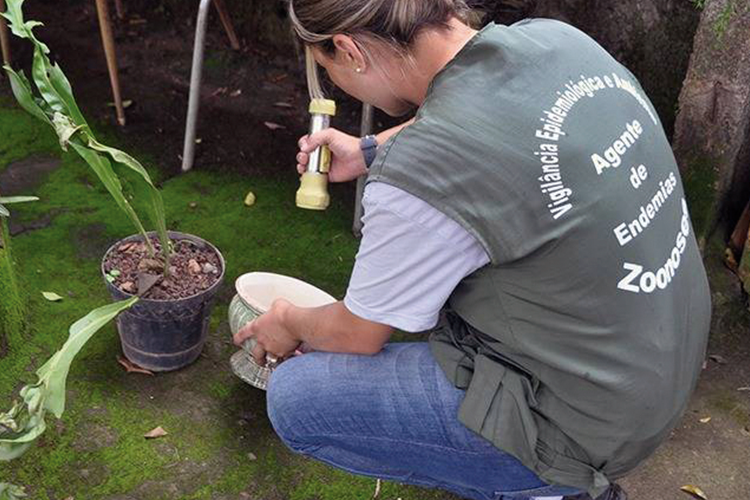Dengue cases increased in Juiz de Fora in 2022 compared to the previous year’s numbers. On the other hand, the numbers are still far from those recorded in the years of the viral epidemic, such as 2019, before the onset of the Covid-19 pandemic. But looking to the coming months, the return of the rainy season and the arrival of summer are turning heads to the possibility of a massive spread of the Aedes aegypti mosquito, the vector of dengue.
According to monitoring data from the State Ministry of Health (SES-MG), Juiz de Fora has recorded, as of last Tuesday (6), 120 confirmed cases of dengue fever. The number represents an increase of nearly 300% compared to the 45 arbovirus notifications recorded throughout 2021. In 2020, the year of the Covid-19 pandemic, the State Department confirmed 171 cases, which is slightly higher than the current number. Unlike in pre-pandemic periods, in the past three years the city has not recorded deaths from the disease.
Although the numbers show an increasing trend in the spread of Aedes aegypti compared to the previous year, the data from Juiz de Fora is a far cry from the epidemic scenario observed in 2019. That year, the city reached 7,435 possible cases of arbovirus, which is The municipality described the disease as having a “very high incidence”, and 14 people lost their lives due to an exacerbation of dengue fever.
Mine has a jump too
As in Juiz de Fora, data for the entire state of Minas Gerais shows an increase in dengue cases. If 23,103 cases were confirmed in 2021, 68,728 people have contracted the viral disease this year, an increase also close to 300%. Minas Gerais figures also show a discrepancy regarding the years of high prevalence of Aedes aegypti. In 2019, 2016 and 2013, 475 thousand, 524 thousand and 416 thousand cases were recorded, respectively.
Throughout 2022, there were 63 arbovirus deaths in the state, with an additional 21 deaths under investigation. Peraptenga and Manhuaço are the only two cities in the Zona da Mata region that have recorded deaths from dengue fever, with one death each.
Liraa refers to the “average risk” of dengue in JF
The municipality of Juiz de Fora (PJF), in a note, stated that the city has a “better situation” in relation to other municipalities with regard to dengue. Data from the municipality indicates 98 confirmed cases of arbovirus in the population, “the expected number for the period of the epidemic,” according to the PJF. The most recent Aedes aegypti Rapid Index (LIRAa) survey, conducted between October and November, indicated an incidence rate of 2.8, placing the city at “intermediate risk” of contracting dengue.
During the survey, says the city council, the most common types of Aedes aegypti infestation points were vases/jars containing water, dishes, returnable bottles and mobile sediments, followed by works, gutters and abandoned or unused structures. Another important point noted was the increase in the denial of entry to agents responsible for inspection. “As most outbreaks occur indoors, it is very important to raise public awareness and support for vector control,” he recalls.
The municipality also stated that it is adopting a strategy of continuous monitoring through “egg traps, which is a sensitive and effective method for detecting the presence of Aedes aegypti.” According to the PJF, the method is “particularly useful for early recognition of new infections, indicating areas of greatest risk and allowing endemic agents to act quickly in implementing focal blocking and treatment strategies.”
The infection specialist warns of underreporting
For infection scientist Marcus Mora, a decrease in the number of dengue notifications in epidemic years does not necessarily mean a slowdown in the spread of cases. According to him, the similarity between the symptoms of dengue fever and Covid-19 makes it vulnerable to underreporting cases of the disease transmitted by Aedes aegypti, which is now of little interest to the population. “Within the epidemic, all diagnosable diseases have been reduced. We believe that there has been an overlap in cases and priority in diagnosing Covid, which has led to an overall decrease, ”the specialist assesses.
Mora raises concerns about the easing of anti-dengue measures over the past few years, given the focused public authority attention on the COVID-19 pandemic. Since epidemiological cycles of viral diseases occur every two or four years, attention should be doubled to the possibility of high prevalence in the coming year, according to the infection doctor.
Therefore, the doctor advises residents to be careful about stagnant water points that can become a breeding ground for Aedes aegypti mosquitoes in homes. In addition, it is important to be aware of the classic symptoms of dengue, such as high fever, body aches, and fatigue. “In the face of any symptom, it is essential that the person seeks medical attention for an evaluation that can even diagnose other illnesses,” Mora warns.

“Wannabe internet buff. Future teen idol. Hardcore zombie guru. Gamer. Avid creator. Entrepreneur. Bacon ninja.”

